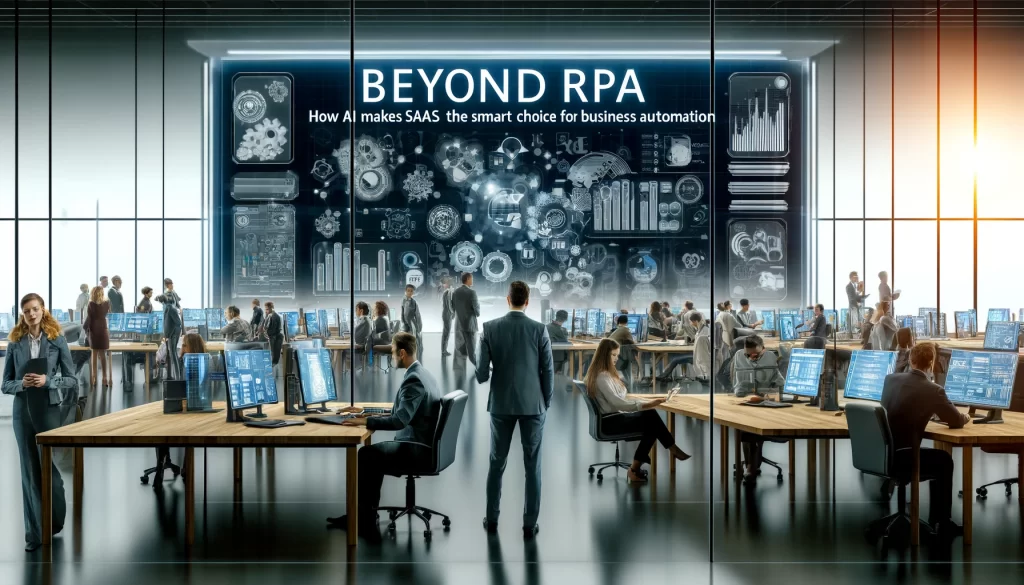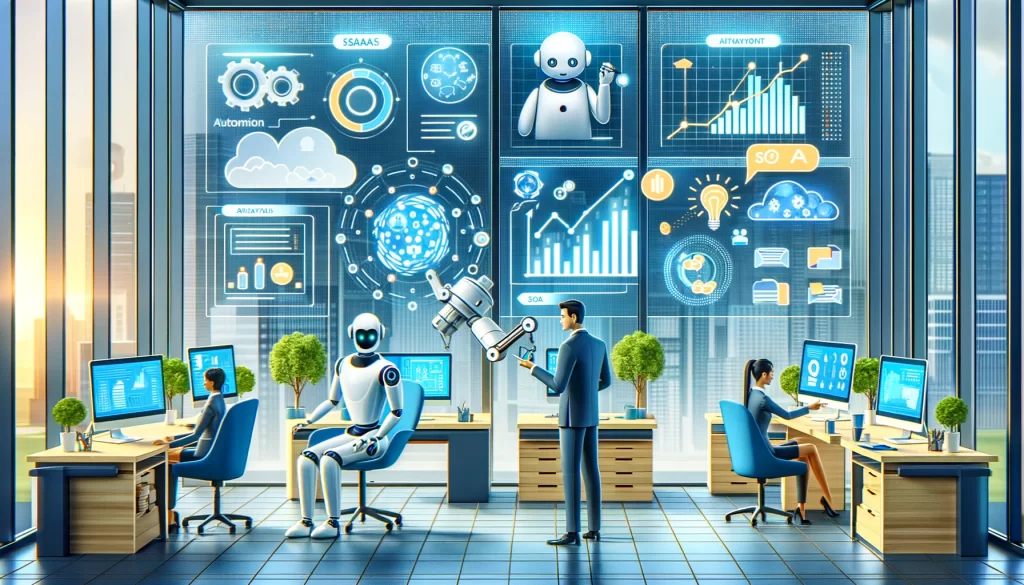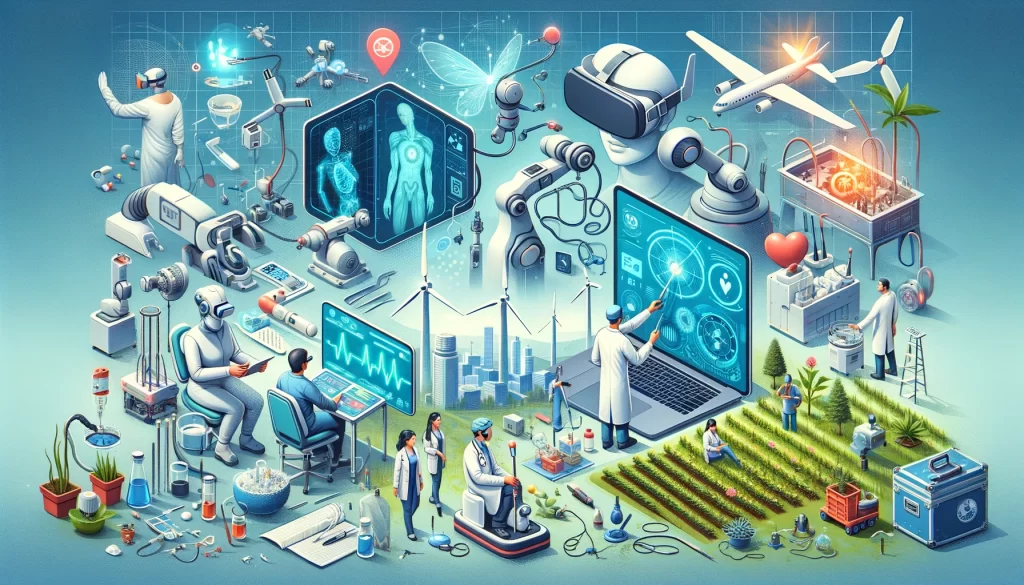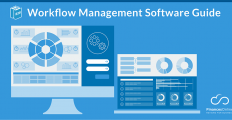Robotic Process Automation (RPA) has been the main tool used by most businesses to automate tedious operations.
RPA is a technology that is shared by computer programs that resemble human activities, like data entry, form completion, and rule-based decision-making. Although RPA has achieved some positive outcomes, it has its limitations at the same time.
On the other hand, SaaS has taken away the need for onsite software & infrastructure, and hence, organizations can be more agile, scalable & cost-efficient at the same time. Although SaaS has been here for over a decade, the power of AI (Artificial Intelligence) is taking it to the next level.

RPA vs. AI-Driven SaaS
RPA is fortified as a tool for implementing robotic automation of recurring tasks in business processes. Performing actions like a human through software robots helps companies automate data entry, form processing, rule-based tasks, and other high-volume low-skill activities. While RPA has been a case of success in boosting efficiency, it nevertheless has some disadvantages.
Limitations of RPA
One of the various limitations of RPA tools is its rigidity. In comparison with human beings, as RPA bots are governed by pre-programmed rules and scripts, they are not capable of handling changes or exceptions and therefore they are not flexible.
In the course of process automation re-coding is usually needed when processes develop, or data formatting is changed, and it produces extra maintenance costs and delay problems.
RPA has also constraints on functions that are restricted to performing the task or process that it is developed for. It lacks the ability to take over, respond, and learn throughout the process. Its rigidity results in the limitation of using the algorithm for simple, repetitive but still complex tasks which are available to solving another algorithm.
Advantages of AI-Driven SaaS
AI-embedded SaaS in business has become the most noteworthy innovation for automation processes by covering artificial intelligence with cloud services.
Unlike RPA, AI can examine data, adapt to variable conditions, and make decisions by using complicated relationships. It is that adaptability that works as an advantage for SaaS ensuring it handles a wide range of assignments and scenarios.
AI-powered SaaS is also instrumental in building collaborative efforts for automation management. SaaS platforms being accessible anywhere where there is an internet connection makes teamwork possible during automation projects, information exchange, and even improvement suggestions. Such a high level of networking and freedom is not that easy to implement with conventional RPA tools.
Consequently, the RPA has been a worthy tool in business automation. However, AI-driven SaaS is the more advanced, flexible, and scale-able solution. RPA can overcome these constraints, but a new wave of automation has emerged.
AI’s Role in Business Automation

AI has emerged as a game-changer in the automation level of the business. Contrary to the traditional RPA, which is based on rigid scripts and rule-based logic, AI brings more dynamic learning techniques into automation.
Custom chatbot development company leverages NLPs to produce AI-based chatbots with recognition and respondent-to-human language.
This transition has generated opportunities for companies that want to improve their own processes and increase productivity.
Enhanced Automation Capabilities
AI includes a wide spectrum of technologies, among these are machine learning, natural language processing, computer vision, and neural networks. These technologies give AI systems the capability to handle complex tasks that were more difficult for robotization.
The NLP has been doing wonders in the business automation facet and the diffusion of AI.
Through NLP, AI can recognize and reply to human language so it can do tasks like customer support chatbots and automatic email responses, by voice recognition systems. This feature not only speeds operations but also helps to create a comfortable environment for customers.
Adaptability and Learning
One of AI in automation’s defining edges is that it is multifaceted and reactive. RPA necessitates adjusting the scripts when business processes change, whereas AI solutions can learn and change without human supervision.
The characteristic of AI which can learn and adjust to different circumstances makes it less flexible and this property entails the amount of time updates and maintenance affects organizations.
Improved Decision-Making
AI-based automation in businesses has seen rapid progression from just basic task completion to being a partner in decision-making. AI can use all complex data available and offer ideas that are used in the decision-making process in business.
This ability to make predictions cannot be overrated, for example in finance, when AI forecasts market trends, or in human resources, where AI can determine patterns in the employees’ performance and retention.
Key Benefits of AI-Powered SaaS for Business Automation

SaaS has revised the automation landscape by offering a wide array of benefits over the traditional one.
Reduced Human Intervention
RPA is always subject to below-the-line monitoring and manual adjustments, especially if there are such issues as changes in business processes. AI-operated SaaS is more adaptive in comparison with customized solutions. In this regard, their capacity to recalibrate and make unexpected decisions on their own considerably reduces supervision to the human level thus redirecting employees to the higher-demand tasks. This flexibility is one of the crucial advantages of AI development services.
Increased Efficiency and Productivity
AI-empowered SaaS enlarges efficiency through mechanization that eliminates critical and labor-intensive tasks.
For AI to be deployed for the automation of the broader spectrum of processes, ranging from ML to NLP. Businesses can use AI for data analysis, customer service, quality control, and compliance, among others.
Scalability and Flexibility
SaaS platforms are generated to be scalable and flexible by which any kind of business can change their resources in terms of demand. This flexibility is of particular importance to those companies that must scale up or down to match seasonal or long-term fluctuations.
The scaling up or down of AI-driven SaaS is not limited by the rising or falling demand, making it possible to get the size required by varied business needs.
Real-World Applications and Use Cases

SaaS is applicable in multiple fields, thus offering innovation in the technology that handles process improvement and increases efficiency.
Customer Support and Engagement
AI-powered SaaS has revolutionized customer support by responding automation to common questions plagues and round-the-clock help. Companies are making use of chatbots and virtual assistants with artificial intelligence to be able to handle customers’ questions.
These chatbots which have been trained using NLP can comprehend and reply to user inquiries in real time, thereby reducing the workload on human agents, as well as enhancing the speed of responses.
Financial Automation and Analytics
SaaS enhances the level of automation by enabling the use of routine tasks, and it also provides stringy knowledge. Companies apply AI to data processing, fraud detection, and compliance audit capabilities.
Using various machine learning techniques, algorithms can work out massive financial data sets to spot patterns and help companies confirm transactions and secure regulatory compliance.
Manufacturing and Quality Control
In terms of manufacturing, AI-based SaaS contributed to the change in quality control and production. AI with computer vision takes control of product inspections, detecting defects or omissions to guarantee only quality final products. Such a level removes the need for visual verification and accelerates production speed.
Challenges and Considerations
SaaS possesses many advantages in enhancing automation in business while implementing them requires companies to tackle certain challenges and take numerous considerations into account for the implementation to be successful.
Data Privacy and Security
With SaaS platforms working in the cloud, they carry and store sensitive data of businesses and clients. While providing the client with a private cloud, companies should ensure that the SaaS providers have proper security safeguards in order to prevent the data from unauthorized access, data breaches, and cyberattacks.
Integration with Existing Systems
Another challenge of implementing AI-driven SaaS is that AI integrates it, not only with existing systems but even with workflows. Many companies have systems of legacy that cannot harmoniously work with SaaS platforms of the modern age.
To solve this problem, companies should assess strictly whether the SaaS tools match the infrastructure they are using. SaaS platforms that have open APIs and extensive interface possibilities are the best. They will make integration easier.
Change Management and Workforce Adaptation
Implementing AI-driven SaaS solutions generally requires significant modifications in the existing business procedures and organizational behaviors. Employees may have to learn new skills or rearrange their work related to themselves. Resistance to change might pose a problem and inadequate training could also hamper the takeoff of SaaS-based automation.
Companies may develop 360-degree change management plans. This is a communication of AI-driven SaaS, training programs aiming at employees to get new abilities, and ongoing services for solving problems or answering questions.
Conclusion
SaaS enabled by AI is the next evolution in business automation, which is more intelligent and progressive than traditional approaches to organizing tasks. Companies will have to be careful in how they apply the technology and flexible in how they deal with upcoming trends that are likely to define automation spaces. The AI SaaS is the most instrumental and leading functional titleholder of this business automation revolution.























Leave a comment!